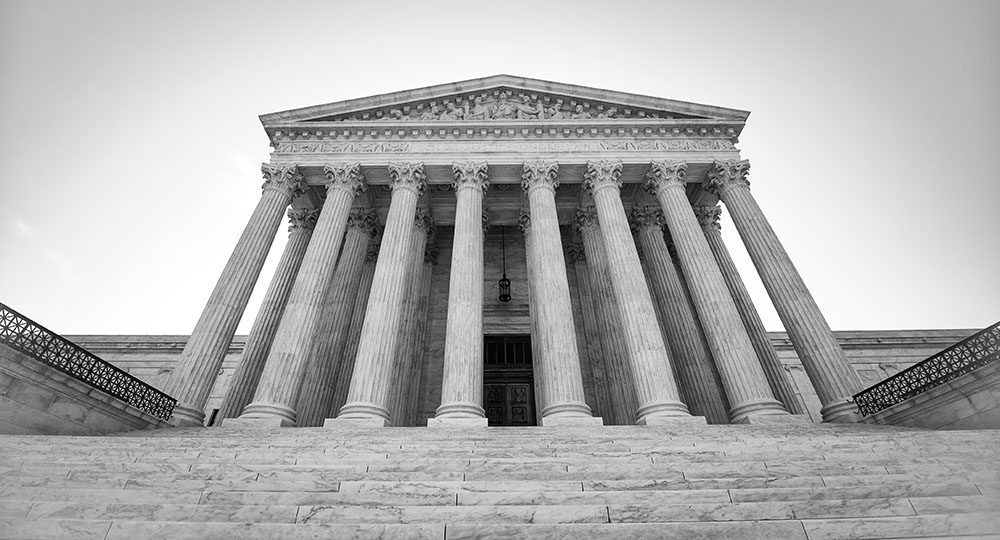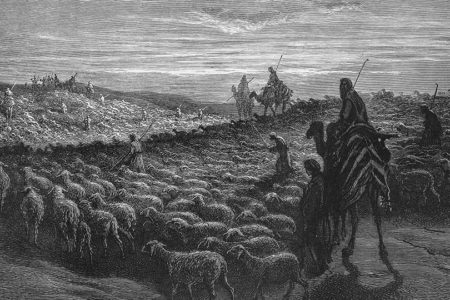The Bible vs. The Classroom:
A Practical Look at an Uneasy Truce
It has been almost five decades since the U.S. Supreme Court banned Bible reading in public schools. In 1963, one year after it struck down state-sponsored prayers in School District of Abington Township v. Schempp, it ruled that teachers violated the Establishment Clause of the First Amendment when they read Scripture aloud. The same decision also banned in-class recitation of the Lord’s Prayer.
As a result, for the last 48 years, church-state separatists have labored feverishly to make sure the “wall of separation between church and state” erected by the Supreme Court continues to act as a de facto Berlin Wall, blocking traditional religious ideas from entering the secular haven of public education. Most Americans have instinctively known from the start that the Supreme Court got it wrong. John Adams’s reflections on the public value of “the Christian Religion” show the Founding Fathers viewed Christianity not only as something of great spiritual merit, but also as a shaper of public virtue.
Adams obviously saw no inconsistency between the First Amendment’s prohibition against government doing anything “respecting an establishment of religion” on the one hand, and the acknowledgment that Christian principles were of vital importance to the fledgling United States on the other. Since the Bible is clearly the source of Christian principles, one would expect the courts to honor our Founders’ intent to treat biblical Christianity as, in Adams’s words, “necessary information” for the citizenry. Obviously, the opposite has occurred.
The Bible and the Battle Lines
In recent years some educators have taken a close look at the 1963 Schempp decision and concluded the Bible has not been banned from public education. Schempp continues to be the pole star by which court decisions are guided. Here is a quotation from it:
It is insisted that, unless these religious exercises are permitted, a “religion of secularism” is established in the schools. We agree, of course, that the State may not establish a “religion of secularism” in the sense of affirmatively opposing or showing hostility to religion, thus “preferring those who believe in no religion over those who do believe.”…In addition, it might well be said that one’s education is not complete without a study of comparative religion or the history of religion and its relationship to the advancement of civilization. It certainly may be said that the Bible is worthy of study for its literary and historic qualities. Nothing we have said here indicates that such study of the Bible or of religion, when presented objectively as part of a secular program of education, may not be effected consistently with the First Amendment. But the exercises here do not fall into those categories. They are religious exercises, required by the States in violation of the command of the First Amendment that the Government maintain strict neutrality, neither aiding nor opposing religion.1
Texas. Needless to say, the separatists have not permitted the Bible-as-curriculum proponents to get off easy. The 2009–2010 school year is a good example. In Texas the legislature passed a law mandating Bible literacy in the state’s schools. Opponents say the law lacks sufficient guidelines. The Dallas Morning News quoted Mark Chancey, an associate professor of religious studies at Southern Methodist University, as saying that failure to provide a well-defined educational plan for the classes “is like sending a teacher into a minefield without a map.” Other critics were not so nuanced.
In a September 2009 online article titled “The Lies of Texas Are Upon You” in The Huffington Post, columnist James Moore ridiculed the entire state of Texas for permitting the Bible to enter the classroom. Sounding (perhaps intentionally) like a latter-day H. L. Mencken at the 1925 Scopes evolution trial, Moore declared, “So this is Texas, folks…where black presidents are not allowed to encourage our children, there are two sides to every story, even McCarthyism, Richard Nixon is the man that saved the world, and the bible [sic] is a text book, and Fox News is on every TV screen.” And all who disagree with him are considered right-wing bigots.
This battle has already seen numerous skirmishes. When schools in West Texas tried to use the Bible before the current state law was passed, the American Civil Liberties Union (ACLU) and People for the American Way filed a federal lawsuit to stop it. The schools had been using a curriculum developed by the National Council on Bible Curriculum in Public Schools (NCBCPS). The plaintiffs claimed the curriculum was “religiously biased” and was a covert attempt to “proselytize” students. The suit was settled, and school officials abandoned the NCBCPS curriculum. With the new Texas law in place, more lawsuits are likely.
Idaho. In Idaho a public charter school had planned to include the Bible in its curriculum, exploring its “literary” and “historical” values (using Schempp decision language). But the Idaho Public Charter School Commission nixed the idea in August 2009. The Alliance Defense Fund later filed a lawsuit in federal court on behalf of the school, arguing the Commission’s ban was exactly the type of “hostility” against religion the Supreme Court warned against in Schempp. That suit is still pending.
Florida. In 1998 the ACLU filed a lawsuit against the proposed use of a NCBCPS Bible curriculum in Lee County (Fort Myers) schools. It argued the proposed instruction violated the First Amendment Establishment Clause, claiming “the curriculum is in fact a sectarian and proselytizing tool.” Those two arguments—that Bible instruction is “sectarian” (taught from a Christian position) and a “proselytizing” opportunity (a veiled attempt to evangelize) are at the heart of the legal debate.
The school district was defended by the American Center for Law and Justice. The federal trial court ruled there was too little evidence that the Old Testament class would be conducted in an illegal manner, and it upheld that part of the curriculum. But it struck down the New Testament curriculum: “This Court too finds it difficult to conceive how the account of the resurrection or of miracles could be taught as secular history.”2
Avoiding the Minefield
The Florida court’s reasoning is utterly confounding. The same decision noted (quoting from another decision on the same subject) several examples of how the Bible has independent, literary merit worthy of study and said many English terms derive from Scripture. If the Bible’s contribution to English literature and Western thought can be taught without violating the First Amendment, why can’t the resurrection be taught as an important issue in world history?
The courts have missed the point of teaching “history.” They wrongly assume that all instruction about Christ’s resurrection constitutes a “religious exercise,” which the Supreme Court forbids. They apparently have bought into the ACLU’s position that teaching about the resurrection is inherently “sectarian” and involves a covert attempt to evangelize.
Paradoxically, the Florida trial judge viewed Christ’s resurrection as “the central statement of the Christian religious faith.” So, to follow this logic, the only material that can be taught about biblical Christianity is, ironically, the material that does not explain the most defining element of one of the world’s major religions.
If we contrast these types of New Testament battles with other religious studies in public school, we see a stunning dichotomy. A move is under way to launch a “comprehensive educational plan” that focuses on the terrorist attacks of September 11, 2001. It will be tested in New York City, California, New Jersey, Alabama, Indiana, Illinois, and Kansas. According to experts, “a range of viewpoints are reflected in the curriculum, including from Muslim scholars, to enrich the discussion.”3 Will the ACLU and People for the American Way file suit there too? Hardly.
Further, California state law requires teaching Muslim history.4 What? Islam can actually be taught as “history”? Then why can’t Christianity? The courts have ignored the Schempp language that states the Bible (which obviously contains the New Testament) may be legally presented in public schools when presented objectively as part of a secular program of education. Notice the critical presupposition: The Bible, which is saturated with theological concepts, can actually be taught “objectively” and consistent with a “secular pro-gram of education.”
How could this task be done regarding the resurrection? Several ways:
- The curriculum could show how the apostles and members of the early church created a powerful religious distinction from traditional religious doctrines of the day, resulting in Christianity. The resurrection gave Christianity its own identity.
- Students could learn how the debate about the historicity of Jesus’ physical resurrection is ongoing today. Liberal scholars distance themselves from it; conservative scholars and preachers embrace it; and the division has helped shape the current denominational landscape.
- Students could compare the Christian creed with other world religions and show similarities and/or differences. Is the “ascension” of Muhammad different from or the same as the Christian claim about Jesus being raised from the dead?
However, “objective” classroom presentation of Christian themes raises another issue. Should Christians want secular teachers dissecting Christian theology? I have no pat answer. But I do have some suggestions:
- Know your school district. Know whether teachers will be required to exert a good-faith attempt not to imply hostility toward Christianity.
- Make sure the instructional materials are age appropriate. The younger the students, the more the courts may deem them susceptible to “indoctrination.” So a higher degree of neutrality would probably be required.
- Create a curriculum that is tailored to your district, so local school officials and the school district attorney will have some intellectual ownership over it. The trial court in the Florida case made a point of noting that the school district attorneys had repeatedly warned school officials about the potential illegality of the proposed, prepackaged curriculum.
- Realize that perfect and absolute neutrality in the classroom is never possible. The key is to craft a curriculum that meets the Schempp requirement that it be “presented objectively.” If the materials lend themselves to an objective presentation, then the neutrality element will likely be satisfied.
Making the Case
Those who support a Bible-as-curriculum proposal need to remember they must be able to make the case to secular education officials. There are a number of academic references that could back up the appropriateness of both the literary and historical approaches to using the Bible. Using nondevotional, secular sources for your argument is essential. However, due to a concerted anti-evangelical bias in much of the academic world, you have to dig to find it. Here are two examples:
Regarding the importance of the Bible and Christian texts to the literary background of famous English writers (specifically Jonathan Swift and the inimitable Dr. Samuel Johnson), a lecturer at the Library of Congress noted, “Swift was reading the Bible, and Dr. Johnson the Book of Common Prayer before each was three.”5
On the issue of the importance of the Bible and Christian literature to the average American in the founding of the nation, one scholar noted, “Americans early on had stressed literacy in their daily, Bible-reading lives, and nearly every visitor from Europe was soon struck by the fact that even chambermaids and husbandrymen owned copies of Pilgrim’s Progress.”6
These types of citations from generally accepted sources, coupled with the acknowledgement by the courts that (at least in theory) knowledge of the Bible is indispensible to a well-rounded education, should be enough to get your foot in the door. Then the truly difficult work of generating an acceptable curriculum begins. And though there may be perfectly logical reasons why Christians might not want secular educators explaining the Bible to their children, the misguided belief that the First Amendment prohibits it should certainly not be one of them.
ENDNOTES
- School District of Abington Township, Pennsylvania v. Schempp, 374 U.S. 203 (1963).
- Gibson v. Lee County School Board et al., 1 F. Supp. 2d 1426 (D.C. Fla. 1998).
- Christian Salazar, “New Program will teach students about 9/11,” Associated Press, September 8, 2009 <abcnews.go.com/US/wireStory?id=8518662>.
- “Mandated Teaching of Islam in California Public Schools—Truth! & Fiction!” <truthorfiction.com/rumors/b/byronislam.htm>.
- Barbara W.Tuchman, The Book, The Center for the Book, Viewpoint Series no. 1, October 17, 1979 (Washington, DC: Library of Congress, 1980), 18.
- Robert A. Rutland, “Well Acquainted with Books”: The Founding Framers of 1787 (Washington, DC: Library of Congress, 1987), 14.







